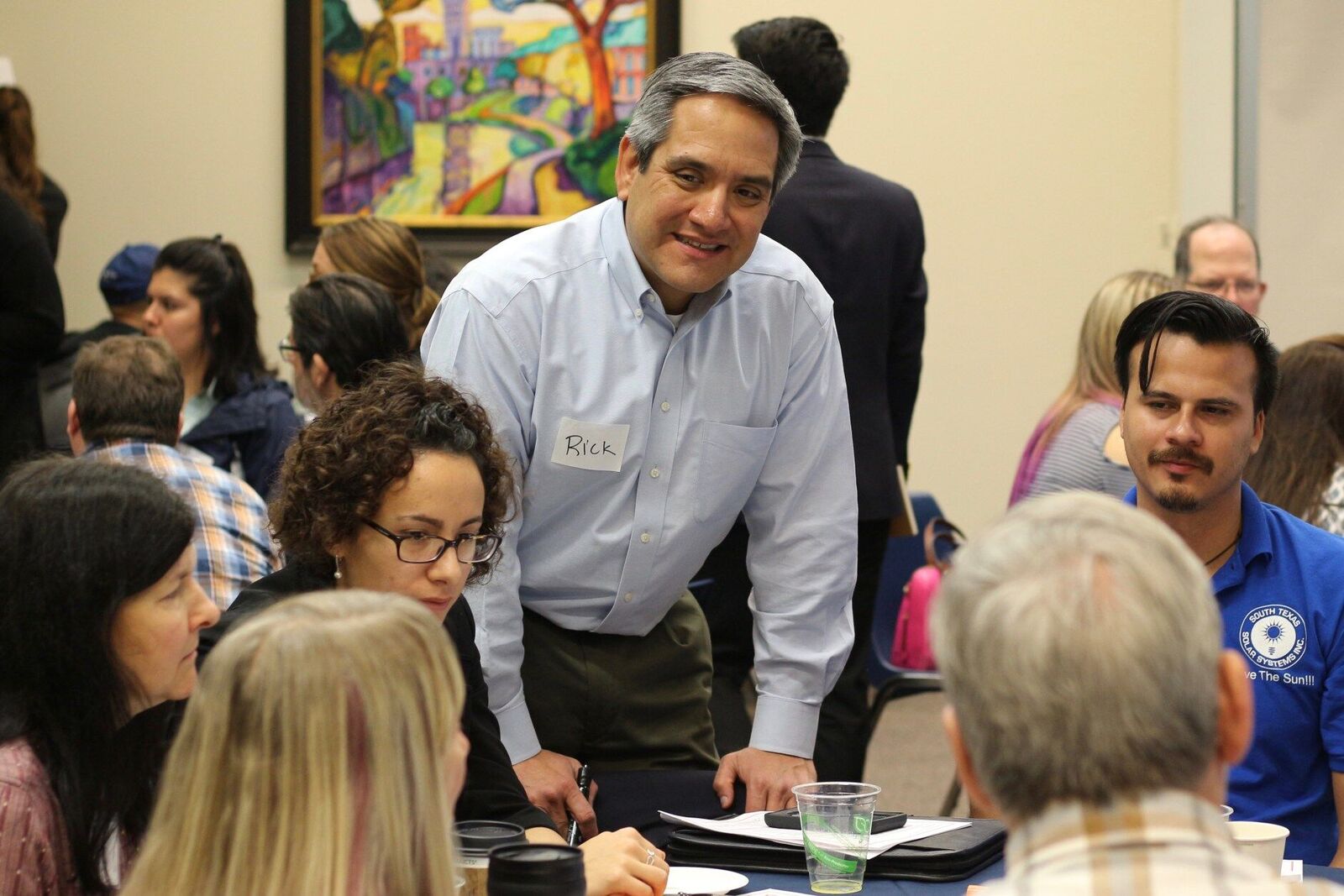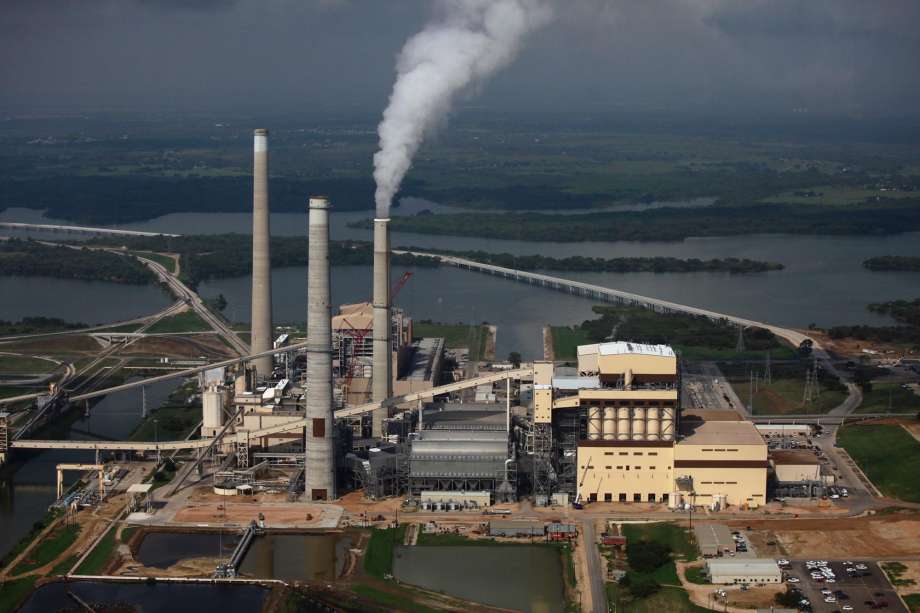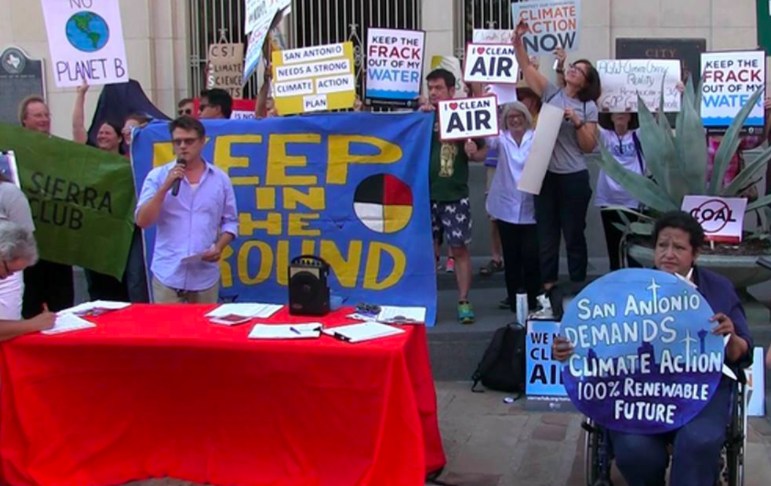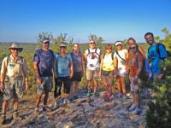Comments from the Chair
Democracy in action!
Texas primary elections are happening now; Election Day is Tuesday March 6th, 7 am to 7 pm. Sierra Club has endorsed three local Democratic candidates which you can view at TurnTexasGreen.org. While visiting this page, please donate to our Political Action Committee and help support our candidates! Additional endorsements will follow after the primaries. Also, don't forget to vote!
Service outing trip to Big Bend
There will be a Big Bend service outing April 30th to May 4th. This should be a beautiful time in Big Bend National Park, possibly with spring flowers in bloom in the desert. The National Parks have billions of dollars of unfunded maintenance needs due to many years of budget starvation from Congress. Volunteer groups like Sierra Club are vital to our Parks, and our service work on trail maintenance and other needs fills a critical gap. Please consider joining this adventure. Please contact Lone Star Chapter Conservation Chair Evelyn Mertz for further details and registration.
The future of energy?
Our CPS Energy public utility held a public “Future of Energy" symposium on February 27. There were some good presentations and the entire event has been posted online. Several of us attended. We heard some good things about renewables and “Smart Cities” development, and the importance of equity and climate change.
We continue to be concerned about the continued reliance on coal, gas and nuclear sources, and will maintain pressure for more rapid deployment of renewable sources, greater efficiency, and reduction of fossil fuel emissions. I agree with the Express-News’s assessment: "Future of Energy" symposium shines little light on what’s next for energy mix.
City utilities need improvement
We also press for more open board management of CPS, with published meeting minutes, and Citizens to be Heard opportunities that don’t exist currently. We are asking for major revamping of the Citizens Advisory Committee, all the actions of which are essentially secret, with no published agendas, no posted meeting dates, no minutes and no Citizens to be Heard.
Mayor Nirenberg has nominated Amy Hardberger, J.D., Eduardo Parra, P.E. and (incumbent) David McGee to the SAWS Board of Trustees. The Alamo Group and Greater Edwards Aquifer Alliance support these nominations. We believe this is an important step in our efforts to change direction at SAWS, to return it to its original mission and away from its current plans to market water sales up the I-35 corridor.
I urge you to call or email your Council person to voice your support for these nominations. I know that Councilman Brockhouse in particular has concerns about Amy Hardberger and needs to hear from her supporters, especially if you live in City Council District 6.
We are at a critical juncture with regard to both public utilities (CPS and SAWS). They both have taken important and admirable steps in terms of conservation and efficiency.
We need a new projector
At our monthly Lions Field Events, we often feature films about environmental issues. However, our old projector and laptop are kaput, and we need replacements.
If you have a digital projector or laptop w/DVD drive you can donate, they would enable us to continue our film programs. Please contact Terry Burns if you know of a potential donor.
However, both see themselves as important drivers for economic development, and subscribe to the traditional "growth is always good" mantra that has led to much of our sprawl, congestion, economic and social inequity, pollution etc. We need smart growth that focuses on serving the communities who live here without spending money to promote more in migration to SA.
Our utilities still operate largely in a fee for service model wherein the more product (energy and water) they sell the more money they make. Our city derives a substantial part of its budget (about 25%) from CPS and SAWS generated revenue. The fee structure for both utilities needs desperately to be changed, decoupling revenue from sales.
This has been done with great success for energy in California, where per capita energy use is about 1/2 what it is in most of the country, due to creative fee structures that guarantee utility revenue while “decoupling” this so financial incentives to build and sell more energy (or water) production no longer exist. See California's Decoupling Policy for details. This change is critically important for our utilities to maintain financial stability and continued reliable service, while becoming much more serious leaders in renewable energy and water, and resource efficiency.
Climate plan off to slow start
The joint City of San Antonio/University of Texas at SA/CPS Energy Climate Action and Adaptation Plan is off to a slow start, with some leadership shakeup recently, and needs constant NGO (e.g. Sierra Club) input and pressure to further community engagement and obtain meaningful results.There was a Town Hall event Saturday Feb 24, which had a good turn out. More opportunities will come, and please keep an eye out for them and get involved!
Editor's note: See "San Antonio Moving From Paris Agreement To Community Climate Agreements" below for more about this event.
Club activities
2018 is the 50th anniversary of the Alamo Group of the Sierra Club. We need ideas how to celebrate. Please let me or other ExCom members know your thoughts!
Earth Day will have better celebrations in San Antonio this year, and we need volunteers to help at events at Woodlawn Lake, Leon Valley, CD 9, etc. Please contact Gay Wright.
by Terry Burns, M.D., Alamo Group Chair
A Northeastern Odyssey: the North Shore of Lake Superior
In Summer 2017 I helped family with a cottage near Eastport, Maine, and then drove west to hike a bit of the Appalachian Trail in the Bigelow Range in northwestern Maine. About the latter see an article in the September 2017 issue of this newsletter. Then on to White Mountains National Forest in New Hampshire for some hikes in the Presidential Range, about which there was an article February 2018. Then west through Adirondack State Park in New York and into Ontario, and south through Minnesota.

At Lake Superior Provincial Park, Ontario. Driftwood and glacially polished rocks. July 2017.
Driving through Ontario along the north side of Lake Superior is quite stupendous. Provincial parks one after another and a national park. There are nice campgrounds and hiking trails through forests, around glacial lakes and along the Lake Superior shoreline. Note the comments below about canoeing and winter travel.

Visiting Ontario
The provincial and national parks often provide campsite reservations and many campgrounds have showers. Check what items may be prohibited or limited for Canada entry. Also, some raw produce may be not be allowed entry into the US, even if it originated in the US.
It is easy to look at on-line maps and make notes about Canadian parks you could visit, when for example, doing the circle route around Lake Superior (here's one web page for that). The park websites provide maps and trail descriptions.

Canoeing and kayaking are good, as you might imagine from the pictures. Some of the parks largely require water travel if you are going to get very far and see very much. Algonquin, a very large park, for example has a web page about canoeing. Quetico Provincial Park, just north of Minnesota, is very large with almost no roads for its size (compared to parks in the US) with a few hiking trails. But in all the parks there are lots of skiing routes, as routes impassible much of the year are in Winters frozen and blanketed with snow.
Most of Ontario still looks like wilderness, though various areas were logged with the timber coming down the rivers and lakes to railheads. With the construction of highways (the Trans-Canada Highway was completed in 1971) most of the railroads and waterways used for logging have been abandoned; but a few railroads are still in use mostly for tourism.

At Pukaskwa National Park I met a small group with sea kayaks preparing to travel east likely for a week or so along the north shore of Lake Superior. They were getting weather updates, a good idea as the lake has a history of extremely severe storms and there are very few harbors and towns along the shore. We know Gordon Lightfoot's song, Wreck of the Edmund Fitzgerald, about a big iron ore carrier that sank in the east end of the lake during a 1975 storm.
by Kevin Hartley, Alamo Group Outings leader
San Antonio Moving From Paris Agreement To Community Climate Agreements
Last June, when federal “leadership” decided to abandon the international effort to address global carbon emissions, the Sierra Club helped mobilize what would become a lobby of roughly 40 allied community organizations under the coalition Climate Action SA to demand that San Antonio's leadership stand up for the principles of the international Paris climate agreement.
As a city, we showed that we won't turn our backs on the world and we won't turn our backs on each other as extreme weather ramps up due to our own industrial greenhouse pollution.
Developing a plan
Last weekend, the city utility (CPS Energy), Office of Sustainability, and UT-San Antonio—working in concert to develop a climate action and adaptation plan (CAAP) for Council adoption early next year—hosted their second official SA Climate Ready gathering.

At the Feb. 24 town hall meeting, CPS Energy Chief Operating Officer Cris Eugster reflected on the December rollout of the CAAP, the 18-month effort's first public event:
“When we met here back in December it was snowing outside, the first time it's snowed in...”
“Climate weirding!” injected local Sierra Club Member Barbara McMillin.
“Exactly,” Eugster replied.
While introductory remarks from Doug Melnick, the city's Chief Sustainability Officer, emphasized rising temperatures, Melnick sought to strike an upbeat tone with references to the City’s annual Fiesta celebration and a slide stating that it is “not the end of the world.”
“Climate change is global, but the impacts, as well as the ability to manage it, are on the local level,” Melnick said.
Then, more than 100 residents spent roughly two hours discussing ways in which city residents could reduce their greenhouse pollution and better prepare themselves for the accelerating disasters being ushered in by climate change.
Obvious targets
Unfortunately, some of the most obvious targets - such as CPS Energy’s outdated polluting coal plants - didn’t come up much at Climate Ready.

Shutting down San Antonio's coal plants, the most massive greenhouse gas point-source polluters in the area (8.3 million metric tons greenhouse gas pollution per year), didn’t rise to the forefront of conversation so much as climate response concepts like strong public marketing of sustainability concepts like recycling, ridesharing, and better transportation options.
A difficult path forward
The path forward for all of us will be a difficult one. Already, the amount of carbon in the atmosphere means we are in for a couple hundred years of rising temperatures and all of the extreme weather that that shift means. If the world fails to act in an aggressive, concerted way to reduce the still-galloping streams of carbon pollution from crushed coal and burnt gas and more, San Antonio summers will twist into months-long, life-threatening experiences beyond the ability of our bodies to regulate.
The Rivard Report spotlighted the work of the Sierra Club and dozens of community organizations working in concert to make sure the equity values embedded in the CAAP's early documents survive the political process through to adoption:
"Outside of the official process, a group of environmental, social justice, and labor groups calling themselves Climate Action SA are meeting on a weekly basis to work on this problem from a different angle, focusing particularly on those disproportionately affected by climate change - the poor, working class, and people of color.

Greg Harman, coalition member and Organizer for the Sierra Club’s Lone Star Chapter, said the city has “an interest in inclusion and bringing historically marginalized and economically oppressed people into the conversation,” but the language used to discuss climate change can be overly technical and alienating to people who aren’t used to it.
"The community partners need to be equal partners in the process, and we’re not there yet,” Harman said. “It’s a trust-building exercise."
- Brendan Gibbons, "Town Hall Draws ‘Climate Champions’ With Aims of Greater Inclusion"
While it will take an “all of the above” approach to protect and empower San Antonio residents at home, along with families around the world, some frank discussion about the monster in the room—coal—is a prerequisite.
Those interested in helping build strong grassroots power to ensure that the justice language of SA Climate Ready survives the typical buzzsaw of developer-driven San Anto politics, visit ClimateActionSA.com and sign up for updates.
For full transparency on who’s being “invited to the table” to help guide the City’s towards a path of climate justice, here’s a list of steering committee members and five working groups - with familiar long-time environmental and social justice leaders - that the Rivard Report published just last week.
Watch our videos
San Antonio Needs Climate Action features interviews collected at SA Climate Ready Town Hall on Saturday, February 24, 2018.
If you weren’t able to make it out to the Feb. 24 SA Climate Ready Town Hall, don’t worry - we streamed segments live on FB:
by Lone Star Chapter

Outings: The Call of the Wild
Visit the Alamo Sierra Club Outings page on Meetup for detailed information about all of our upcoming Sierra Club Outings.
The Alamo Sierran Newsletter
Richard Alles, Editor
Published by The Alamo Group of the Sierra Club, P.O. Box 6443, San Antonio, TX 78209, AlamoSierraClub.org.
The Alamo Group is one of 13 regional groups within the Lone Star Chapter of the Sierra Club.
Keep your email address current!
Send updates to Loyd Cortez, providing your name, address and membership number (if known).
Changed your mailing address?
Have you moved? Let us know by sending your old address, your new address and your member number (look on the upper left corner of your mailing label) to: address.changes@sierraclub.org.
Go online for the latest news and events
 |